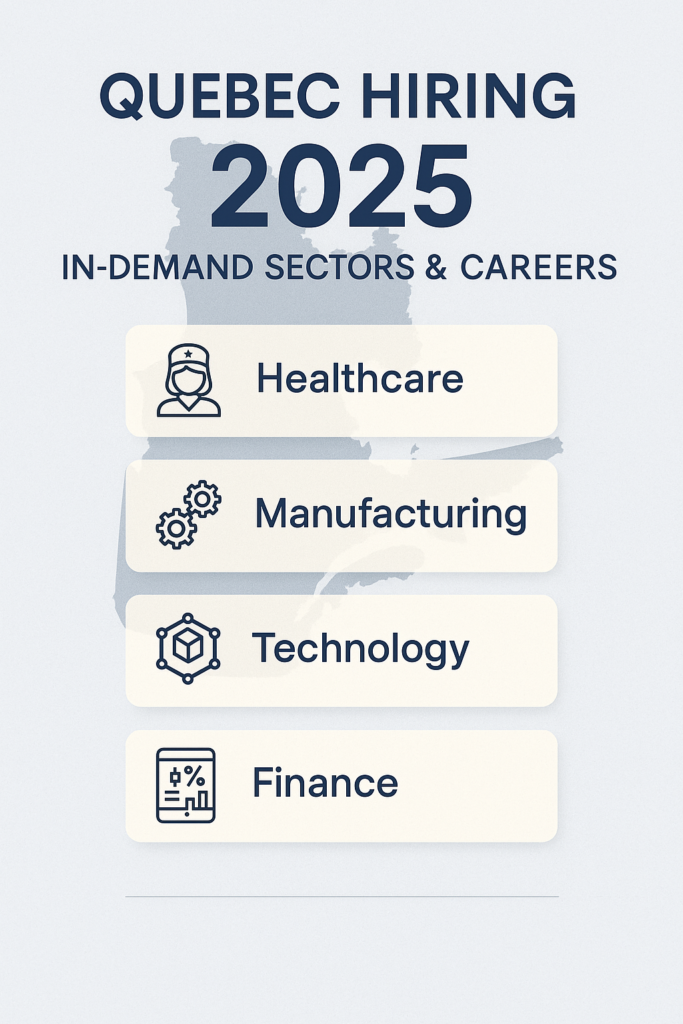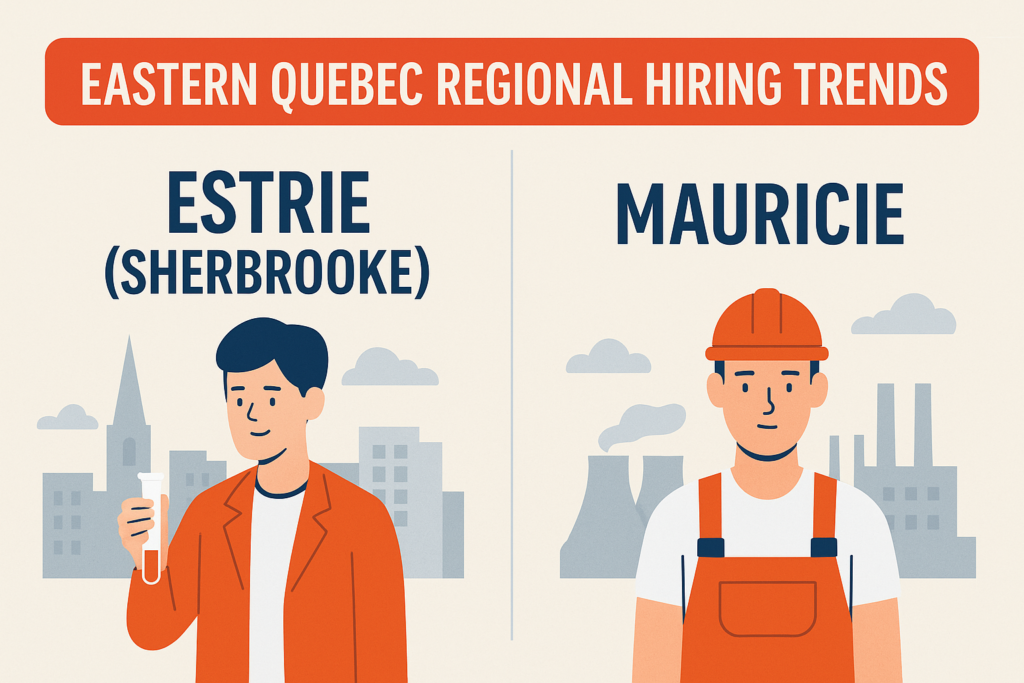The Quebec job market 2025 is set for a significant surge, driven by an aging workforce, strategic investments, and a strong push for digital transformation. This guide will walk you through the top-hiring regions, the most in-demand roles, and realistic salary expectations, equipping you with the insights and tools to navigate Quebec's evolving job landscape. With Dr. Job's resources, you can quickly find and land a fantastic role in this dynamic market.
Quebec Hiring at a Glance (2025)
Quebec's job market is strong in 2025, driven by immigration, AI adoption, and major public and private investments. This has created a resilient market with diverse opportunities, as employers seek to fill a growing talent gap. High-tech, healthcare, aerospace, and advanced manufacturing are all showing significant growth. The province's economy is uniquely positioned as a North American leader in specialized fields like AI research and video game development. These trends, combined with needs in skilled trades and logistics, mean there are a variety of in-demand jobs available for newcomers, recent graduates, and experienced professionals alike. You can begin your job search on our main Canada jobs portal.

Where Hiring Is Strongest: Quebec Regions
The job market in Quebec is a mosaic of different regional economies. While Montréal is the largest city and a major economic engine, opportunities are expanding into surrounding areas, each with its own unique focus.
Montréal CMA
Montréal leads the province in tech, AI, gaming/VFX, aerospace, fintech, and creative industries. The city is a magnet for top talent, with a vibrant startup ecosystem and global corporations.

Québec City
Québec City’s job market is defined by a strong public sector presence, a growing insurance and finance industry, and a specialized focus on life sciences and cybersecurity.
- Cybersecurity Analyst: As government agencies and financial firms harden their systems, analysts with certifications are in high demand. Typical pay: CAD 75k–115k with relevant certifications.
- Business Analyst (Insurance/IT): The insurance and IT sectors are undergoing massive core system upgrades and data projects, creating a need for skilled business analysts. Typical pay: CAD 65k–100k depending on domain expertise.

Laval & North Shore
This region is a key hub for biopharma, medical devices, and large-scale distribution centers. Its proximity to Montréal makes it a crucial part of the province’s logistics and healthcare supply chain.
- QA/RA Specialist (Life Sciences): Companies in the biopharma and med-devices space are scaling up, with a constant need for specialists to manage compliance and regulatory pipelines. Typical pay: CAD 70k–110k with GMP/ISO experience.
- Warehouse Supervisor: The growth of e-commerce has led to a need for skilled supervisors who can manage high-throughput operations and warehouse automation. Typical pay: CAD 55k–85k + shift premiums.

Estrie (Sherbrooke) & Mauricie
Known for its advanced manufacturing and clean tech, this region benefits from strong university ties that foster innovation and R&D.
- Process Engineer: Manufacturers are hiring engineers to improve throughput, reduce waste, and increase efficiency in their plants. Typical pay: CAD 70k–110k with Lean/6σ certifications.
- Electrical/Controls Technician: As plants automate, there is a consistent need for technicians to install, maintain, and troubleshoot robotics and control systems. Typical pay: CAD 60k–95k + overtime.

Outaouais (Gatineau) & Laurentides
This area is a major centre for public administration due to its proximity to Ottawa. It also has a strong telecom sector and a busy construction trade.
- Network Engineer: The ongoing rollout of high-speed internet and the maintenance of public networks create steady demand for network professionals. Typical pay: CAD 70k–110k depending on the technology stack.
- Red Seal Electrician/Plumber: A boom in residential construction and public infrastructure projects means a constant need for certified, skilled trades professionals. Typical pay: CAD 60k–105k + allowances.

Sectors Powering Quebec’s Job Surge in 2025
While some regions specialize, several key sectors are driving hiring across the entire province. This is where most of the new jobs are being created.
Technology & AI
Quebec’s tech ecosystem continues to thrive with a constant need for talent in SaaS, fintech, cybersecurity, and ML/AI. The province is a global leader in AI research, with roles expanding from academia into product development. Essential skills include proficiency in Python, cloud platforms (AWS/Azure/GCP), and a solid grasp of data engineering.
- Typical pay: CAD 75k–140k+ depending on the role and tech stack.
- To create a CV that's ready for Canada’s tech industry, use our AI Resume Builder.

Gaming & VFX
Montréal is a global gaming powerhouse, and major studios are consistently scaling their operations. This creates strong demand for developers, artists, and technical specialists who can work with real-time engines and modern pipeline tools. Proficiency in Unreal or Unity, Houdini, and Python is highly valued.
- Typical pay: CAD 60k–115k depending on discipline and project credits.
- Build a portfolio-focused resume that gets noticed by using our AI Resume Builder.

Aerospace
The Greater Montréal Area is one of the world’s largest aerospace clusters. The industry is hiring across airframe manufacturing, avionics, maintenance, repair, and overhaul (MRO), and complex supply chain logistics. Key skills include proficiency in design software like CATIA and SolidWorks, as well as knowledge of quality assurance standards like AS9100.
- Typical pay: CAD 70k–120k across engineering and quality assurance.
- Reach multiple aerospace employers at once with our powerful Auto-Apply tool.

Healthcare
The healthcare sector faces a persistent talent shortage, creating a consistent need for professionals. Hospitals, clinics, and long-term care facilities across Quebec are hiring nurses, technologists, administrators, and informatics specialists. French proficiency can significantly boost your prospects, and it is crucial to have your credentials officially recognized.
- Typical pay: CAD 60k–105k depending on specialty and region.
- Many healthcare roles involve panel interviews. Prepare for these with our AI-powered Interview Prep tool.

Advanced Manufacturing & Trades
Quebec’s manufacturing sector, from food processing to medical devices and plastics, is highly automated and needs skilled workers to maintain operations. Roles for millwrights, welders, and electricians are in high demand to support ongoing production and new projects. Key skills include PLC programming, industrial networking, and lean manufacturing principles.
- Typical pay: CAD 55k–105k + premiums for shifts and tickets.
- Get your applications out quickly to multiple plants and firms with the Auto-Apply tool.

Logistics & Warehousing
The expansion of e-commerce and a focus on domestic supply chains are fueling a robust logistics sector. Ports, distribution centers, and third-party logistics firms are constantly hiring for roles from warehouse associates to dispatchers and inventory specialists.
- Typical pay: CAD 40k–80k depending on the role and shifts.
- Use the AI Resume Builder to create a resume with the right operations and logistics keywords to get past ATS filters.

How to Get Hired Faster in Quebec
Landing a job in Quebec requires a tailored approach. Here is a short, practical playbook to help you stand out.
Optimize Your Resume for Canadian Standards
First, tailor your resume to be ATS-friendly. Use keywords directly from the job description and quantify your results whenever possible. Remember that a bilingual resume (English and French) can give you a significant advantage, especially for roles outside of Montréal’s core tech sector. Use our AI Resume Builder to optimize your CV for both languages.

Master the Interview Process
Next, master the interview process. Be ready for both technical and behavioral questions. In Quebec, it’s not uncommon for interviews to be conducted in both English and French, so be prepared to demonstrate your language skills. Our Interview Prep tool can help you practice and build confidence. After your interviews, always follow up with a thank-you note.

Leverage Networking and Smart Tools
Finally, leverage networking. Join industry-specific meetups, follow top employers on LinkedIn, and connect with professionals in your field. Many jobs are filled through referrals before they are ever posted publicly. For every role you apply for, use a tool like our AI Salary Checker to ensure your salary expectations are in line with market rates. For a streamlined job search, our Auto-Apply feature can help you apply to multiple jobs quickly.

FAQ: Quebec Jobs 2025
Which Quebec cities have the most jobs in 2025?
Montréal has the largest number of jobs, particularly in tech and finance. Other major hubs include Québec City (public sector, IT), Laval (life sciences), and Gatineau (government, telecom).
What roles are most in demand in Quebec right now?
In-demand roles in Quebec include software engineers, nurses, cybersecurity analysts, and skilled trades professionals like electricians. The demand is driven by the digital economy and critical infrastructure needs.
What is a good salary in Quebec in 2025?
A good salary in Quebec is highly dependent on location and profession. While a household income of CAD 70,000 to CAD 90,000 is comfortable in many regions, a good salary in a major city like Montréal can be over CAD 100,000.
Do I need French to work in Quebec?
While many tech jobs in Montréal are bilingual, French proficiency is generally required for most roles, especially those involving client interaction or work outside the largest urban centres. It is a significant asset for any job search in the province.
Are remote or hybrid jobs common in Quebec?
Yes, remote and hybrid work is common, particularly in the tech, finance, and creative sectors. Many employers have adopted a flexible work model, allowing for a better work-life balance for those in these roles.
How can newcomers find jobs in Quebec quickly?
Newcomers can accelerate their job search by getting their credentials recognized, networking with local professionals, and gaining Canadian experience through volunteering or contract work. Tailoring your resume for the Quebec market is also essential.
For additional insights, read our articles on the Canada 2025 Job Market and Where the Jobs Are in Ontario.

For more information, visit these official government sources:
- Statistics Canada: https://www.statcan.gc.ca
- Government of Quebec: https://www.quebec.ca
Author
Dr. Job Pro Editorial Team | Suleiman Alnsour
We analyze Canada’s job market and employer hiring trends to help you land the right role faster. Our guides combine salary research, sector insights, and practical application tips. Visit us to explore Canada jobs.









 2025-11-28
2025-11-28
 2025-11-24
2025-11-24
 2025-11-18
2025-11-18
 2025-11-11
2025-11-11
 2025-11-10
2025-11-10